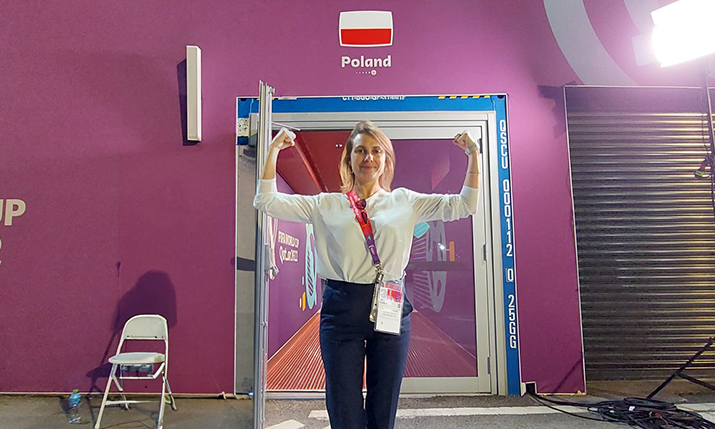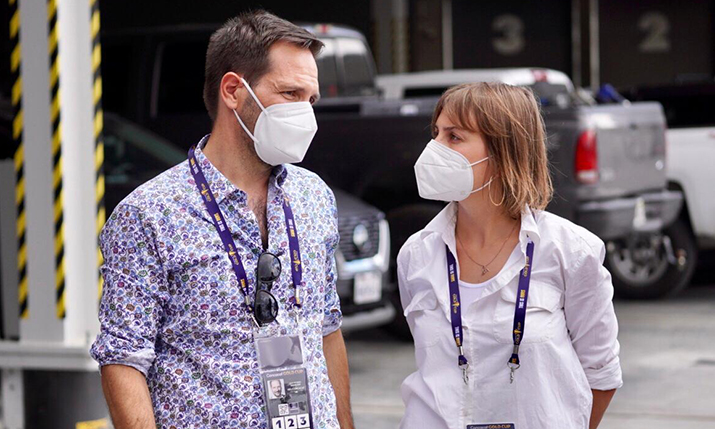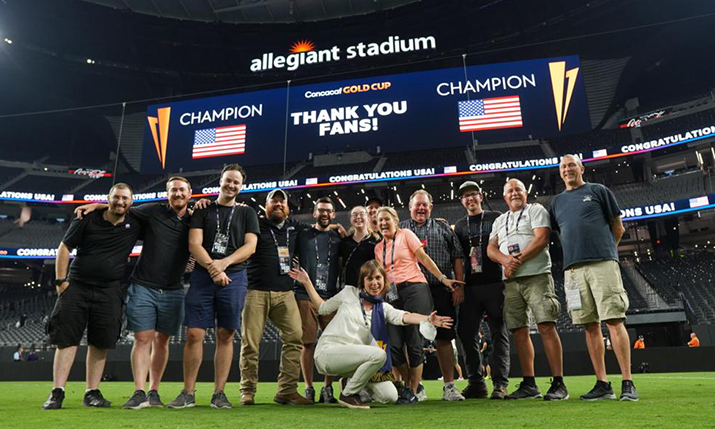Nothing is impossible: HBS’ Katarzyna Humska on daring to believe, and production managing the live coverage of major sporting tournaments

Katarzyna Humska HBS production manager at the FIFA World Cup in Qatar
Like many, Katarzyna Humska’s career was interrupted by the COVID pandemic but, undeterred, she is now back on track, loving life and her job working as a production manager with Host Broadcast Services (HBS) on the live broadcast of some of the biggest sporting events in the world.
You last chatted with SVG Europe back in 2020. What has happened to you and your career in that time?
Thinking back to our last chat, it feels unbelievable how unexpected the evolution of a career within this industry can be.
At that moment during extremely challenging COVID times, I was living in Barcelona, working on La Liga delivery within the new reality of social distancing and PPEs, where nothing was certain and each production could be turned into a nightmare due to positive PCR tests. Who would have figured that only 10 months later I would be living in Paris, travelling to the US as part of the HBS core production team and working on the delivery of 2021 Concacaf Gold Cup?
I assure you that if someone had told me during our first interview that in the next few years, I would be based in Paris, working as a production manager on FIFA World Cup Qatar 2022, the FIFA U20 Women’s World Cup Costa Rica 2022, the 2021 and 2023 Concacaf Gold Cups, among others, I would probably have laughed at them. Yet, here we are.
Tell us about your current role and how you got it.
The usual way: a colleague forwarded me the link to the job offer posted on HBS website. I sent my resume and after three online interviews, I was invited to join the team in Paris.
What prompted you to apply?
Now, that’s a bit less straightforward. Once more, throwing it back to our chat during the summer of 2020, I was totally dedicated to La Liga production and did not foresee launching myself into the market in search of a new job. Several factors came into play leading to this decision. After five years of living in Barcelona, and working tirelessly on that project, I was craving change, a small revolution. And I did try it internally first. I tried to take the turn in my career by joining the Mediapro Studio team hoping to be part of some of the great cinematic productions they oversee. But the conversations on this move were happening in February 2020, so you can imagine the rest of the story! Another life defined by COVID.
Football production proved at that time to be the most stable audio-visual business and, with the cinema industry being on hold, my professional life continued in sports broadcasting, and I stopped thinking about any change. Until, a few months later, I saw that job offer outlining my everyday responsibilities as job description, but from Paris and working on the FIFA World Cup. That was the small revolution I was searching for.

Katarzyna Humska, HBS production manager, before the Concacaf 2021 Gold Cup Final at the Allegiant Stadium in Las Vegas with director Sebastian Von Freyberg
Did you face any challenges getting (and keeping) that job?
I’m not sure if I can refer to the job interviews themselves as hard – the interviewers were extremely nice in all cases – but it was a challenge to suddenly find myself applying for a job: I had been working in the same place since my fourth year of university.
I also couldn’t ignore the fact that Mediapro and HBS are competitors in certain markets and for certain events: the compliance side of integration in a new company is essential here.
I don’t mean I struggled with it, but you must be mindful of aspects of your new work that could be considered company-specific and sensitive, when catching up with your friends from previous jobs. What I found challenging while adapting to the production manager’s role at HBS is the difference between the workflows and organisations of the two companies: HBS is very structured, with clear delimitation of each department’s responsibilities, whereas the team at Mediapro were involved in all processes. Transitioning from one to the other was not easy, but extremely enriching. Thanks to this, I feel comfortable in any type of production.
“Right now, I love everything about my job: the excitement of live broadcasting; delivering amazing events in remote corners of the world; learning different ways of doing things; and meeting so many new people from different backgrounds.”
Did you find any part of the role difficult to adapt to?
Probably, the scale of the project I was being onboarded for. Not many elements of the production plan were alien to me after working on LaLiga production, which is extremely innovative, but the amount of documentation and planning behind a FIFA World Cup host broadcast preparation is certainly overwhelming at the very start.
On my arrival, I was given a 438-page Detailed General Action Plan (DGAP), the production plan bible to get familiar with the operations.
Not being fully capable of defining which of its elements was impacting my role directly – due to the differences in the workflows between HBS and my previous employer which I mentioned before – was quite intimidating.
Furthermore, HBS is all about perfection. There is no room for under-delivery and to achieve the required level of excellence, you dedicate hours to fine-tuning the processes and their description. Learning how to work focused on how to deliver a seamless event rather than putting down fires was certainly challenging at the very start.
What do you find most rewarding?
Right now, I love everything about my job: the excitement of live broadcasting; delivering amazing events in remote corners of the world; learning different ways of doing things; and meeting so many new people from different backgrounds. Being part of a project that brings joy and really matters a lot to millions of people around the globe is something extremely rewarding.

Katarzyna Humska with the Game Creek Video team at the Concacaf Gold Cup in 2021
As a woman, have you faced any obstacles preventing you from progressing in your career?
It is not easy to be a young woman in this business. I do believe it is changing and improving year after year, but there is still a long way ahead of us.
I am also discovering that a big part of the challenges lies within ourselves. It is logical that in a new role you have to prove yourself. It is the same for men and for women. But, the issue I see is that, as women, we tend to question ourselves more, aim more for perfection, and eventually end up not having enough guts to speak up, even when we know we have the right solution or answers. It is essential to believe in oneself and to remember it is ok to make mistakes. They help us to learn. Leaving our comfort zone is what makes us grow.
What advice would you give to other women looking to further their careers in sports broadcasting?
Believe in yourself and try. Nothing is impossible. The most important thing is to dare. It might be that you don’t fall in love at first sight, but the industry is huge, the number of productions around the world is uncountable. There are more opportunities than you can imagine and the industry is desperate for talent. Don’t be afraid to try, change and search for more if you seek something else. It’s worth it.
“I believe the introduction of IP-based workflows is one of the most revolutionary innovations in the sports broadcasting world. It is still an ongoing transition, but moving away from depending on cables and baseband transmission is opening so many possibilities for remoting and centralising operations.”
On a more general level, what’s the most demanding thing about working in live sports production?
The volume of productions around the world and the budgetary restrictions. The audio-visual industry is producing more and more, optimising resources and implementing new tools and technologies: cloud-based solutions, IP-based workflows, and software-based tools with limited redundancy. It seems it is becoming cheaper to produce, but at the same time, workforce cost is growing, as the number of professionals is limited, and not all new technologies can be applied to top-tier events. Not yet.
There is a necessary learning and testing curve behind all those innovative solutions, which are probably key to the future of broadcasting, but currently what is seen is a huge push to reduce costs, with a lack of enough workforce on the market to deliver all the events.
Let’s talk tech. How has recent technology evolution influenced you, your job and sports broadcasting?
I believe the introduction of IP-based workflows is one of the most revolutionary innovations in the sports broadcasting world. It is still an ongoing transition, but moving away from depending on cables and baseband transmission is opening so many possibilities for remoting and centralising operations, that the broadcast world will never be the same again.
Suddenly, it is possible to access almost any piece of equipment from hundreds or thousands of kilometres away: it opens doors to consistency and cost optimisation without losing reliability. The same applies to transmission, moving every time more towards IP streams, not relying anymore on satellite and weather conditions.
What’s the coolest thing you’ve worked on during your career and why?
Without a doubt the FIFA World Cup Qatar 2022 final on 18 December 2022. Unforgettable game, incomparable emotions, being at the quality control room at the IBC, our heart of live operations during the WC, was simply breath-taking.

